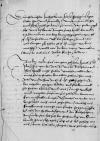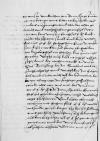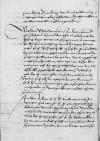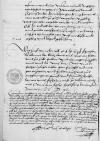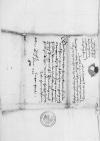Wir haben negst bey unnserm kamer jungen zwey briffe, / den cf. Albrecht I von Hohenzollern-Ansbach to Ioannes DANTISCUS Königsberg, 1540-01-20, CIDTC IDL 4976⌊erstencf. Albrecht I von Hohenzollern-Ansbach to Ioannes DANTISCUS Königsberg, 1540-01-20, CIDTC IDL 4976⌋ XX, / den cf. Albrecht I von Hohenzollern-Ansbach to Ioannes DANTISCUS Königsberg, 1540-01-21, CIDTC IDL 4977⌊andrencf. Albrecht I von Hohenzollern-Ansbach to Ioannes DANTISCUS Königsberg, 1540-01-21, CIDTC IDL 4977⌋ ein tag darnoch[2] gegeben, / von E(wer) f(urstlichen) D(urchlauch)t erhaltenn. / Uff die selbigen ( domit wir mit langen shreyben E(wer) f(urstlichen) D(urchlauch)t nicht verdris machen ) wolle wir in dem, was von noten, / unnser antwurt / in die kurtze stellenn. /
Inn dem cf. Albrecht I von Hohenzollern-Ansbach to Ioannes DANTISCUS Königsberg, 1540-01-20, CIDTC IDL 4976⌊erstencf. Albrecht I von Hohenzollern-Ansbach to Ioannes DANTISCUS Königsberg, 1540-01-20, CIDTC IDL 4976⌋ hab wir gern gelesen, / das E(wer) f(urstliche) D(urchlauch)t die zufur von den iren in Ermland (Warmia, Varmia), diocese and ecclesiastical principality in northeastern Poland, 1466-1772 within the Kingdom of Poland, Royal Prussia⌊unser bischtum und herschafftErmland (Warmia, Varmia), diocese and ecclesiastical principality in northeastern Poland, 1466-1772 within the Kingdom of Poland, Royal Prussia⌋ nicht haben verboten, / allein teurung zuverhutten, / den alten gebreuchen noch, / iren unnderthan in E(wer) f(urstlichen) D(urchlauch)t Ducal Prussia⌊herczigthumDucal Prussia⌋ / in den negsten gelegen steten und flecken / marck zw halten befolen, / unnd was so nicht verkofft wurd / weytter zw furen zw gelossen, / daran wir kein misfallen tragen, dieweyl es under uns der gestalt auch wirt gehalten, / nemlich mit kawffmans warhe wie flachs, hoppen etc. Es ist aber im hollandischen und im balgischenn inn sunderheit, / des sich der Georg von Polentz (*1478 – †1550), the first Protestant bishop of Samland; private secretary of pope Julius II; 1516 Komtur in Königsberg; 1518 bishop of Samland (also after the secularization of bishopric in 1525); 1521-1523 administrator of Pomesania bishopric (ADB, Bd. 26, p. 382-385; ORACKI 1988, p. 85-86)⌊hochwirdig von SamelanndtGeorg von Polentz (*1478 – †1550), the first Protestant bishop of Samland; private secretary of pope Julius II; 1516 Komtur in Königsberg; 1518 bishop of Samland (also after the secularization of bishopric in 1525); 1521-1523 administrator of Pomesania bishopric (ADB, Bd. 26, p. 382-385; ORACKI 1988, p. 85-86)⌋ herre schreybt, / solch E(wer) f(urstlichen) D(urchlauch)t geboth, / wie aus seiner lieb oben shreÿben / uns gleichmessig /  GStA PK, HBA, C. 1, No. 628, f. 1v an unnser Citizens of Braunsberg ⌊unnderthanCitizens of Braunsberg ⌋ von Braunsberg (Braniewo), town in Ermland (Warmia), 19 km NE of Elbing (Elbląg), port on the Vistula Lagoon, a member of the Hanseatic League⌊BransbergeBraunsberg (Braniewo), town in Ermland (Warmia), 19 km NE of Elbing (Elbląg), port on the Vistula Lagoon, a member of the Hanseatic League⌋ zuvernemen, / das wir unns bitten widerschicken, / vil annders ausganngen / unnd uber den alten gebrauch unnd wolgehaltene gewonheyt ( wie wir von denn unnsern bericht ) E(wer) f(urstlichen) D(urchlauch)t dorffleuten bey schwerer straff unnd buss verboten, / das aus E(wer) f(urstlichen) D(urchlauch)t hertzogthum keiner in unser lannd zw marckten sol faren, / ehr habe dan von der obrigheyt ein zeychen, / das zuvor nye gewesen. / Dobey auch disse newheyt uffgesetzt ( damit der wochen marckt in unser stat Braunsberg (Braniewo), town in Ermland (Warmia), 19 km NE of Elbing (Elbląg), port on the Vistula Lagoon, a member of the Hanseatic League⌊Brau(n)sbergBraunsberg (Braniewo), town in Ermland (Warmia), 19 km NE of Elbing (Elbląg), port on the Vistula Lagoon, a member of the Hanseatic League⌋, der im sonabent wirt besucht, / abgelegt unnd verghe ) das im Heiligenbeil (Święta Siekierka, Świętomiejsce), town in Ducal Prussia, today Mamonovo in Russia, Kaliningrad Oblast⌊HilgenbeilHeiligenbeil (Święta Siekierka, Świętomiejsce), town in Ducal Prussia, today Mamonovo in Russia, Kaliningrad Oblast⌋ / unnd Zinten (Cynty), town in Ducal Prussia, Samland, ca. 25 km E of Heiligenbeil, today Korniewo⌊CintenZinten (Cynty), town in Ducal Prussia, Samland, ca. 25 km E of Heiligenbeil, today Korniewo⌋ auch uff den sonnobent, / der der vor alweg war im freytage, / gehaltenn wurde, / des wir uns mit den unsernn vor E(wer) f(urstliche) D(urchlauch)t, / die in irem schreiben keine newheyt zw gestaten ahnzeigen, / nicht unbillich weys beschweren / unnd bitten abermols wie zuvor mit hochem fleis, E(wer) f(urstliche) D(urchlauch)t wolde aus sunder gunst, / die wir bey der zw habenn unns gentzlich versehenn, / solch bedrengmis paper damaged⌈[is]is paper damaged⌉ aus dem balgischen uff E(wer) f(urstlichen) D(urchlauch)t gemeinenn paursman unnd die unnsern ahngese[...] paper damaged⌈[...][...] paper damaged⌉ abzuthun befhelen. Das wir umb E(wer) f(urstliche) D(urchlauch)t
GStA PK, HBA, C. 1, No. 628, f. 1v an unnser Citizens of Braunsberg ⌊unnderthanCitizens of Braunsberg ⌋ von Braunsberg (Braniewo), town in Ermland (Warmia), 19 km NE of Elbing (Elbląg), port on the Vistula Lagoon, a member of the Hanseatic League⌊BransbergeBraunsberg (Braniewo), town in Ermland (Warmia), 19 km NE of Elbing (Elbląg), port on the Vistula Lagoon, a member of the Hanseatic League⌋ zuvernemen, / das wir unns bitten widerschicken, / vil annders ausganngen / unnd uber den alten gebrauch unnd wolgehaltene gewonheyt ( wie wir von denn unnsern bericht ) E(wer) f(urstlichen) D(urchlauch)t dorffleuten bey schwerer straff unnd buss verboten, / das aus E(wer) f(urstlichen) D(urchlauch)t hertzogthum keiner in unser lannd zw marckten sol faren, / ehr habe dan von der obrigheyt ein zeychen, / das zuvor nye gewesen. / Dobey auch disse newheyt uffgesetzt ( damit der wochen marckt in unser stat Braunsberg (Braniewo), town in Ermland (Warmia), 19 km NE of Elbing (Elbląg), port on the Vistula Lagoon, a member of the Hanseatic League⌊Brau(n)sbergBraunsberg (Braniewo), town in Ermland (Warmia), 19 km NE of Elbing (Elbląg), port on the Vistula Lagoon, a member of the Hanseatic League⌋, der im sonabent wirt besucht, / abgelegt unnd verghe ) das im Heiligenbeil (Święta Siekierka, Świętomiejsce), town in Ducal Prussia, today Mamonovo in Russia, Kaliningrad Oblast⌊HilgenbeilHeiligenbeil (Święta Siekierka, Świętomiejsce), town in Ducal Prussia, today Mamonovo in Russia, Kaliningrad Oblast⌋ / unnd Zinten (Cynty), town in Ducal Prussia, Samland, ca. 25 km E of Heiligenbeil, today Korniewo⌊CintenZinten (Cynty), town in Ducal Prussia, Samland, ca. 25 km E of Heiligenbeil, today Korniewo⌋ auch uff den sonnobent, / der der vor alweg war im freytage, / gehaltenn wurde, / des wir uns mit den unsernn vor E(wer) f(urstliche) D(urchlauch)t, / die in irem schreiben keine newheyt zw gestaten ahnzeigen, / nicht unbillich weys beschweren / unnd bitten abermols wie zuvor mit hochem fleis, E(wer) f(urstliche) D(urchlauch)t wolde aus sunder gunst, / die wir bey der zw habenn unns gentzlich versehenn, / solch bedrengmis paper damaged⌈[is]is paper damaged⌉ aus dem balgischen uff E(wer) f(urstlichen) D(urchlauch)t gemeinenn paursman unnd die unnsern ahngese[...] paper damaged⌈[...][...] paper damaged⌉ abzuthun befhelen. Das wir umb E(wer) f(urstliche) D(urchlauch)t  GStA PK, HBA, C. 1, No. 628, f. 2r freundtlich zuverdinen / unnd mit gutter nutzlicher zuneigung derselbten unnderthan allenthalbenn wollen lossenn genissenn. /
GStA PK, HBA, C. 1, No. 628, f. 2r freundtlich zuverdinen / unnd mit gutter nutzlicher zuneigung derselbten unnderthan allenthalbenn wollen lossenn genissenn. /
Was denn edlen unnsern sonnderen freundt, herr(n) Achatius von Zehmen (Achacy Cema) (*ca. 1485 – †1565), 1517-1531 Chamberlain of Pomerania, 1531-1546 Castellan of Gdańsk (Danzig), 1545-1546 Voivode of Kulm (Chełmno), 1546-1565 Voivode of Marienburg (Malbork) (SBPN 1, p. 194-195; ORACKI 1984, p. 38-39; Urzędnicy 5/2, p. 198; PSB 4, p. 325-326)⌊Achaciu(m) CzemenAchatius von Zehmen (Achacy Cema) (*ca. 1485 – †1565), 1517-1531 Chamberlain of Pomerania, 1531-1546 Castellan of Gdańsk (Danzig), 1545-1546 Voivode of Kulm (Chełmno), 1546-1565 Voivode of Marienburg (Malbork) (SBPN 1, p. 194-195; ORACKI 1984, p. 38-39; Urzędnicy 5/2, p. 198; PSB 4, p. 325-326)⌋, dantzker castellan etc. der 1540-01-30⌊gestrig tags1540-01-30⌋ von unns gezogen, / mit seinem wyderteil zuvertragenn / unnd die copey, / die wir negst E(wer) f(urstlichen) D(urchlauch)t zugeschickt, / ob sich der h(err) castellan darzw bekent, / anghet, / wissen wir seines widersachers halben, / wie der zw dem vertrag gesinth, / nichts zw schreibenn, / dieweil wir bisher kein antwurt uff koniglich befhel, / des wir im ein abshrifft zwgeschickt, / uberkomenn. / Wes sich aber der h(err) dantzker castellan erbeut, / auch was er sich uff die cf. Achatius von ZEHMEN (CEMA) to Ioannes DANTISCUS Heilsberg (Lidzbark Warmiński), 1540-01-28, CIDTC IDL 5373⌊copeycf. Achatius von ZEHMEN (CEMA) to Ioannes DANTISCUS Heilsberg (Lidzbark Warmiński), 1540-01-28, CIDTC IDL 5373⌋ erinnern kan, / wirt E(wer) f(urstliche) D(urchlauch)t aus seinem eigen hantshreyben, / das wir auch wider an uns zw komenn bitten, / haben zuvernemen(n). /
Inn dem andren E(wer) f(urstlichen) D(urchlauch)t cf. Albrecht I von Hohenzollern-Ansbach to Ioannes DANTISCUS Königsberg, 1540-01-21, CIDTC IDL 4977⌊briffecf. Albrecht I von Hohenzollern-Ansbach to Ioannes DANTISCUS Königsberg, 1540-01-21, CIDTC IDL 4977⌋, / wie auch im vorigen, / hab wir E(wer) f(urstlichen) D(urchlauch)t ganntz gunnstig erbittenn gen unnser person / unnd die unnsern mit sonnderem trost verstanden. / Thun unns auch des hochlich gen E(wer) f(urstliche) D(urchlauch)t bedanncken, / die unns, / mit Gots hülff, / num(m)er sol annders spurenn unnd finden, / dan wie die von uns bisher  GStA PK, HBA, C. 1, No. 628, f. 2v erfarenn / unnd aus unserm munde in gegenwertigheit angehort. / Wer ouch vil danncksagung in der dennischen handlung, / die wir etwan uns allen zu guth vorgestelt, / unnotig. / Was wir aber weytter wusten unnd mochten E(wer) f(urstlichen) D(urchlauch)t und all der verwanten / zu ehren, / nutz unnd gutter wolfhart / ausrichtenn / und wirglich zw thun, / erbitt wir uns ane boschwerde wyllig unnd mit on the margin⌈mitmit on the margin⌉ begird geflissenn. /
GStA PK, HBA, C. 1, No. 628, f. 2v erfarenn / unnd aus unserm munde in gegenwertigheit angehort. / Wer ouch vil danncksagung in der dennischen handlung, / die wir etwan uns allen zu guth vorgestelt, / unnotig. / Was wir aber weytter wusten unnd mochten E(wer) f(urstlichen) D(urchlauch)t und all der verwanten / zu ehren, / nutz unnd gutter wolfhart / ausrichtenn / und wirglich zw thun, / erbitt wir uns ane boschwerde wyllig unnd mit on the margin⌈mitmit on the margin⌉ begird geflissenn. /
Was sunst von noten uff E(wer) f(urstlichen) D(urchlauch)t letzst schreyben, / ist oben mit der kurtz beantwurt, / das wir bitten unns zw gutte halten / unnd derwegen sich ghen unns unnd die unnsern, / wie unnser hochgunstiger, lieber herr freun written over ...⌈... illegible⌈...... illegible⌉nn written over ...⌉dt und nachpar erzegenn unnd halten, / auch uns aus angefanngener gunst / unnd freundtschafft, / der wir unns befhelenn nicht zu lossenn. /
 GStA PK, HBA, C1 No 628 6v
Dem durchlauchten, hochgebornen fursten unnd herrn, hern
GStA PK, HBA, C1 No 628 6v
Dem durchlauchten, hochgebornen fursten unnd herrn, hern  GStA PK, HBA, C. 1, No. 628, f. 1r
GStA PK, HBA, C. 1, No. 628, f. 1r  GStA PK, HBA, C. 1, No. 628, f. 1v an unnser
GStA PK, HBA, C. 1, No. 628, f. 1v an unnser  GStA PK, HBA, C. 1, No. 628, f. 2r freundtlich zuverdinen / unnd mit gutter nutzlicher zuneigung derselbten unnderthan allenthalbenn wollen lossenn genissenn. /
GStA PK, HBA, C. 1, No. 628, f. 2r freundtlich zuverdinen / unnd mit gutter nutzlicher zuneigung derselbten unnderthan allenthalbenn wollen lossenn genissenn. /
 GStA PK, HBA, C. 1, No. 628, f. 2v erfarenn / unnd aus unserm munde in gegenwertigheit angehort. / Wer ouch vil danncksagung in der dennischen handlung, / die wir etwan uns allen zu guth vorgestelt, / unnotig. / Was wir aber weytter wusten unnd mochten E(wer) f(urstlichen) D(urchlauch)t und all der verwanten / zu ehren, / nutz unnd gutter wolfhart / ausrichtenn / und wirglich zw thun, / erbitt wir uns ane boschwerde wyllig unnd mit on the margin⌈mitmit on the margin⌉ begird geflissenn. /
GStA PK, HBA, C. 1, No. 628, f. 2v erfarenn / unnd aus unserm munde in gegenwertigheit angehort. / Wer ouch vil danncksagung in der dennischen handlung, / die wir etwan uns allen zu guth vorgestelt, / unnotig. / Was wir aber weytter wusten unnd mochten E(wer) f(urstlichen) D(urchlauch)t und all der verwanten / zu ehren, / nutz unnd gutter wolfhart / ausrichtenn / und wirglich zw thun, / erbitt wir uns ane boschwerde wyllig unnd mit on the margin⌈mitmit on the margin⌉ begird geflissenn. /
